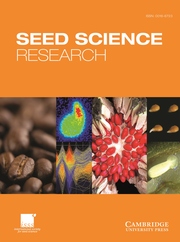Article contents
Germination-related proteins in wheat revealed by differences in seed vigour
Published online by Cambridge University Press: 19 September 2008
Abstract
Artificial aging of wheat grains (Triticum aestivum cv. Mercia) for 3 d resulted in the gradual loss of seed vigour without loss of viability, but the latter decreased rapidly over the next 24 h. Loss of vigour was expressed as a delay in germination i.e. an increasing ‘lag’ period with aging before the onset of radicle emergence, but the subsequent rate of seedling growth was not affected. There was an overall decrease in the incorporation of 35S-methionine into protein in aged embryos, and associated with the aging-induced delay in the completion of germination (i.e. start of radicle emergence) there was a delay in the production of certain polypeptides. In embryos of both non-aged and aged seeds these polypeptides appeared just prior to radicle emergence but several of these were never synthesized in embryos from non-viable seeds. The synthesis of mRNA coding for in vitro translated polypeptides, or groups of polypeptides, was similarly delayed in lowvigour embryos. Furthermore, some polypeptides were identified which were induced by the accelerated aging treatment. It is concluded that a reduced level of protein and mRNA synthesis in the embryos of low-vigour seeds may result in the delay in the accumulation of specific of mRNAs and polypeptides which are needed for the normal completion of germination, i.e. radicle emergence.
- Type
- Research Papers
- Information
- Copyright
- Copyright © Cambridge University Press 1998
References
- 7
- Cited by


